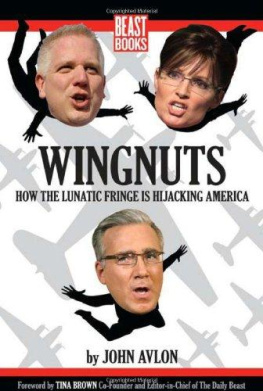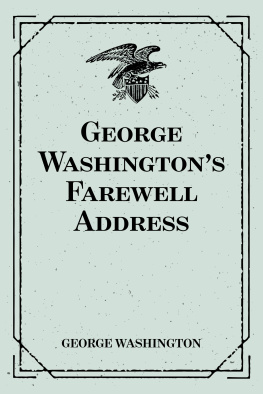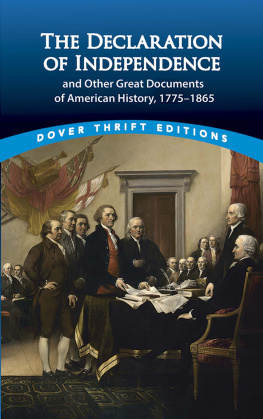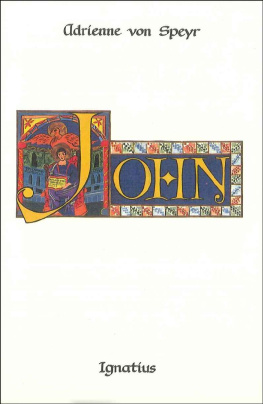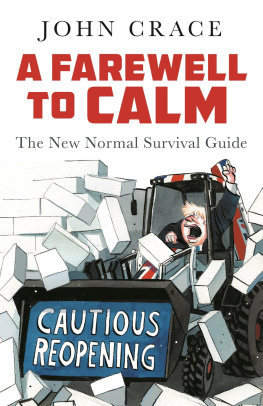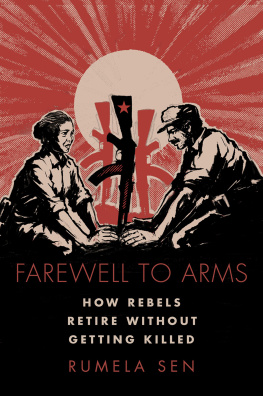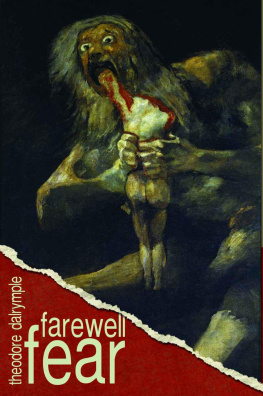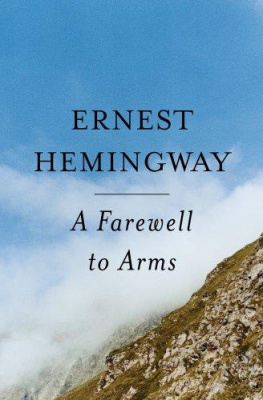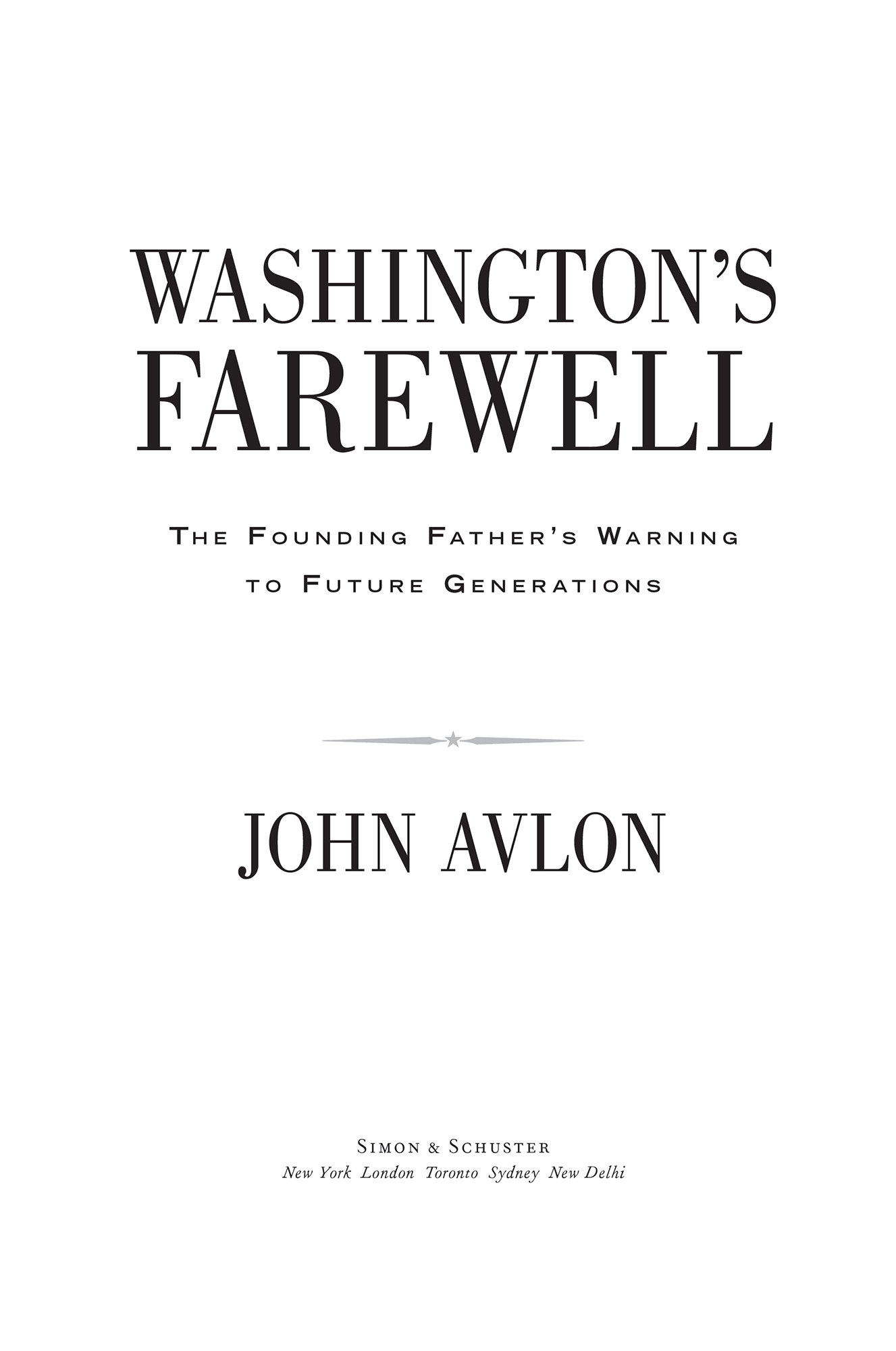Thank you for downloading this Simon & Schuster eBook.
Join our mailing list and get updates on new releases, deals, bonus content and other great books from Simon & Schuster.
C LICK H ERE T O S IGN U P
or visit us online to sign up at
eBookNews.SimonandSchuster.com
A LSO BY J OHN A VLON
Independent Nation: How the Vital Center Is Changing American Politics
Wingnuts: How a Lunatic Fringe Is Hijacking America
Deadline Artists: Americas Greatest Newspaper Columns (editor with Jesse Angelo and Errol Louis)
Deadline Artists: Scandals, Tragedies and Triumphs (editor with Jesse Angelo and Errol Louis)

Simon & Schuster
1230 Avenue of the Americas
New York, NY 10020
www.SimonandSchuster.com
Copyright 2017 by John Avlon
All rights reserved, including the right to reproduce this book or portions thereof in any form whatsoever. For information address Simon & Schuster Subsidiary Rights Department, 1230 Avenue of the Americas, New York, NY 10020.
First Simon & Schuster hardcover edition January 2017
SIMON & SCHUSTER and colophon are registered trademarks of Simon & Schuster, Inc.
For information about special discounts for bulk purchases, please contact Simon & Schuster Special Sales at 1-866-506-1949 or .
The Simon & Schuster Speakers Bureau can bring authors to your live event. For more information or to book an event, contact the Simon & Schuster Speakers Bureau at 1-866-248-3049 or visit our website at www.simonspeakers.com.
Interior design by Renato Stanisic
Jacket design by Tom McKeveny
Jacket art: George Washington, 1819 (oil on panel), Stuart, Gilbert (1755-1828) / Huntington Library and Art Gallery, San Marino, CA, USA / The Huntington Library, Art Collections & Botanical Gardens / Bridgeman Images
Library of Congress Cataloging-in-Publication Data
Names: Avlon, John P., author.
Title: Washingtons farewell : the founding fathers warning to future generations / by John Avlon.
Description: New York : Simon & Schuster, 2017. | Includes bibliographical references and index.
Identifiers: LCCN 2016045258 (print) | LCCN 2016048212 (ebook) | ISBN 9781476746463 (hardback) | ISBN 9781476746470 (paperback) | ISBN 9781476746487 (ebook)
Subjects: LCSH: Washington, George, 17321799. Farewell address. | Washington, George, 17321799Influence. | National characteristics, American. | BISAC: HISTORY / Military / United States. | POLITICAL SCIENCE / Government / General. | HISTORY / United States / Revolutionary Period (17751800).
Classification: LCC E312.952 .A94 2017 (print) | LCC E312.952 (ebook) | DDC 973.4/1092dc23
LC record available at https://lccn.loc.gov/2016045258
ISBN 978-1-4767-4646-3
ISBN 978-1-4767-4648-7 (ebook)
To the past, present, and future
With endless appreciation:
My parents, John and Dianne
My bride, Margaret
And our children, Jack and Toula Lou
CONTENTS




The moderation and virtue of a single character probably prevented this revolution from being closed, as most others have been, by a subversion of the liberty it was intended to establish.
T HOMAS J EFFERSON ON G EORGE W ASHINGTON.

INTRODUCTION
This is the story of the most famous American speech youve never read.
Once celebrated as civic scripture, more widely reprinted than the Declaration of Independence, George Washingtons Farewell Address is now almost forgotten. Our first founding father intended it to be his last political will and testamentthe sum of his hard-won wisdom from a half-century of public service in war and peace.
Most political speeches are full of promises, New Deals and New Covenants. Washingtons Farewell was a warning from a parting friend, written for future generations of Americans about the forces he feared could destroy our democratic republic. Chief among these were hyper-partisanship, excessive debt and foreign warsdangers we still struggle with today.
Washington also used his Farewell Address to proclaim first principles that could offer enduring solutions: the pursuit of peace through strength, the wisdom of moderation, the importance of virtue and education to a self-governing people, as he established the precedent of the peaceful transfer of power. This was Washingtons final revolutionary act: an open letter to the American people, not formally delivered in front of legislators, but published in a newspaper on September 19, 1796.
When he announced his retirement after two bruising terms as president, the success of the American experiment was far from certain. Just twenty years after the Declaration of Independence and less than a decade since the Constitutions adoption, the country was erupting into opposing factions, even within Washingtons cabinet. Civil war seemed to be a real possibility.
The Articles of Confederation had been too weak to sustain the nation in the years after independence, requiring the triage of a closed-door Constitutional Convention and the election of Washington as the first president. There was no guarantee this incarnation of the republic would survive.
Already there were riots, insurrections and threats of secession. A sin tax on liquor provoked an armed Whiskey Rebellion in the western wilderness of Pennsylvania. Overseas, our revolutionary allies in France were overcome by a revolution of their own, as guillotine enthusiasts in the Jacobin regime dispatched ambassadors to undermine Washingtons government, with near-treasonous assistance from his own cabinet officers. In the presidents home state of Virginia, political opponents offered up a chilling toast: a speedy death to Washington!
Through sheer force of will and a gritty commitment to the governing principle of moderation, Washington kept these forces at bay while our infant independent nation gained enough strength to stand on its own.
None of it was easy. The old lion wanted to retire.
At age sixty-four, he still stood a head taller than most men, but his health was beginning to fail, sparking gossip among rivals that Washington was growing old, his bodily health less firm, his memory always bad, becoming worse. Always an uncomfortable public speaker, low-voiced and halting, his lack of oratorical confidence was at least in part a function of physical discomfort. The president was down to a single tooth, with a set of dentures hanging around a lonely left bicuspid. His artificial teeth were state-of-the-art for the time, but the man had a menagerie in his mouth: teeth carved from walrus tusks and hippopotamus bone (then sonorously known as sea horse) as well as the repurposed teeth of nine slaves. This required a clenched jaw and a minimum of smiles.
The most self-monitoring of men in public, Washington was becoming brittle and short-tempered in private, occasionally erupting into towering rages. Unaccustomed to direct criticism as a general on the battlefield, he was surprisingly thin-skinned when attacked in the political arena, complaining to Thomas Jefferson that he was being slandered by the press in such exaggerated and indecent terms as could scarcely be applied to a Nero; a notorious defaulter; or even to a common pickpocket.
Next page

